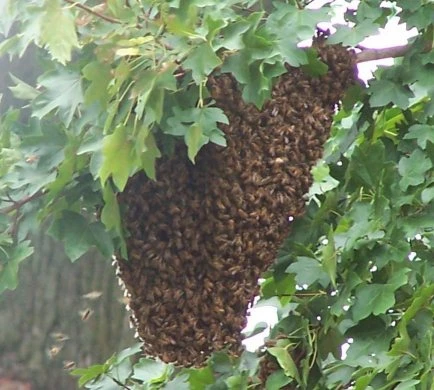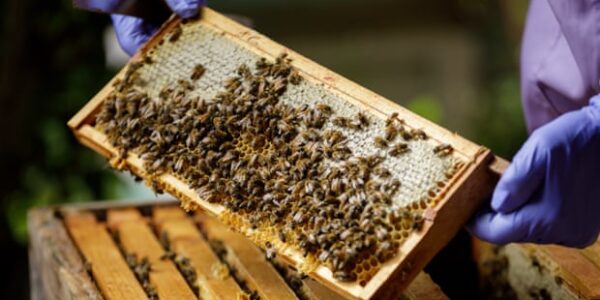
The sky is blue, the sun is shining and t-shirt sleeves are now the norm. Hooray spring/summer has arrived at last. My colonies have survived the winter and the first few weeks of spring, an anxious time where I wait and hope they are all ok before I get a chance to make my first full inspection of each hive. However spring into summer comes with a whole host of other issues. One that the general public find particularly bothersome is swarms and not just honey bees but nests and collections of other bees and flying insects too. As a beekeeper I can only deal with honey bees, very distinctive in their behaviour and usually seen as a swarm in a large black cluster attached to a fence post or tree branch as the picture above demonstrates. Other bees such as bumbles or solitary bees may be in your compost bin, wall cavity, in your garden shed or getting under roof tiles. Honey bees can take up residence in such places too but small confined spaces such as those described here are not usually frequented by honey bees (I stress usually as after all we are dealing with nature!).
So why do bees swarm? Swarming is a natural reproductive instinct, it enables the colony to reproduce a new young Queen when they feel their current Queen is maybe getting a little too old for her job. If they didn’t do this the colony would eventually die out as the production of new bees slowed and eventually stopped.
So what happens in the colony when bees swarm? The worker bees decide for their own reasons that they need a new Queen, that may be as explained above that the current Queen is maybe a year or so old and therefore not doing as good a Queen job as she did last year, or it may be that there are now so many bees in the colony, 50,000 or so that some of the bees are not receiving enough Queen pheromone and so are actually starting to think they have no Queen, or the colony maybe getting too big for the space it currently occupies, they simply need more room. In each of these cases the workers will develop an egg that the Queen has laid into a Queen cell, they are trying to raise a new Queen.
The current Queen sees this and knows that if a new Queen comes along, a younger, stronger, fitter Queen she will be killed, therefore she decides to exit the colony and take with her half the current population. This process does not occur overnight, it is a well timed performance and dependent on many factors including the weather and can take weeks to prepare for, thus it is unpredictable. A beekeeper will be aware that his colony is trying to swarm, the presence of Queen cells during a regular inspection certainly fills me with fear and a clever beekeeper will try and work with his colony to ensure that he fulfils their current swarming need without losing half the colony as they exit with the old Queen. However despite the beekeeper’s best efforts sometimes a swarm will still occur, we are after all dealing with nature here and a wild insect.
What next? If the old Queen has her way half the colony gorge themselves on honey and then exit the hive with her to go settle on a tree branch, fence post or hedge. Scout bees leave the swarm in search of a more permanent residence and once one is found will inform the rest of the swarm and they all move there. In the meantime back at the hive the new Queen hatches, goes on her mating flight, hopefully doesn’t get eaten by a bird and so makes it back to continue the growth of what is left of that original colony, thus the colony continues to survive for another year.
Do you have a swarm? Over the past few months, I have had many calls and emails regarding bees in people’s gardens, compost bins or under roof tiles. So far only one has been honey bees and they very upsettingly had taken up residence in a chimney and had been there for quite some time. A difficult case, very difficult to access a chimney to remove them. The others were all cases of bumbles or solitary bees such as mason bees. My advice is to leave them alone if they are not causing a nuisance. A few more weeks and they will be gone, naturally dying out as Autumn comes. In the meantime enjoy seeing them, introduce you children to them and understand that bees are not be feared, that we need to encourage bees into our gardens as without bees 70% of our food disappears.
If you think you have a honey bee swarm please go to the following link where you can view pictures of different bees to determine whether they are indeed honey bees and if they are you can find your local beekeeper who will remove them for you if possible.
http://www.bbka.org.uk/help/do_you_have_a_swarm.php
I hope this brief explanation has been helpful and interesting. Any further advice please contact me via the contact page here.
Carly x




